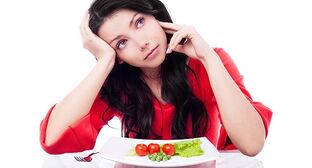Pancreatitis is one of the most serious diseases of the digestive system. Distinguish between acute and chronic pancreatitis, each of these types has its own characteristics and methods of treatment.

But in pancreatitis, one thing remains the same: the old lifestyle and diet will be a thing of the past, because the basis of treatment for pancreatitis is almost a lifelong diet. The pancreas does not forgive eating errors, it responds immediately with pain and indigestion.Pancreatitis is one of the most serious diseases of the digestive system. Distinguish between acute and chronic pancreatitis, each of these types has its own characteristics and methods of treatment.
Basics of Pancreatitis
Pancreatitis is an acquired disease that develops with frequent and severe eating disorders after abdominal trauma, viral damage to the pancreas, liver and gallbladder disorders, alcohol and other toxic substances - long-term starvation, diets to lose weight.
The main symptoms of pancreatitis are:
- abdominal pain - sharp, dagger, almost dull or painful until fainting in acute pancreatitis or in the chronic version;
- nausea and vomiting;
- fecal diseases, more severe diarrhea, fever;
- Acute weight loss.
Acute pancreatitis usually requires hospitalization. Chronic exacerbations can be treated at home, but only under the supervision of a physician. Self-medication for pancreatitis is dangerous with the development of complications ranging from pancreatic necrosis (enzymatic dissolution of glandular tissue, pancreatic self-digestion) and the development of fatal peritonitis.
Nutritional treatment for pancreatitis
Medications, enzymes, and diet for pancreatitis are selected by the physician based on the patient's condition and test data. However, the general principles of dietary adjustment always remain approximately the same. They relax the digestive and pancreas, ie reduce pain and normalize well-being.
Nutrition in pancreatitis is severely limited - most of the usual foods should be forgotten.Often, you need to eat about 5-6 times a day - every 2, 5-3 hours, with an 8-hour sleep break. But the portions in the volume should be small - about 200-250 g, especially for the first time after the exacerbation of the disease.
All dishes are processed mechanically - almost all of them are used in their form. Then, as the inflammation subsides, larger particles appear in the food, but you must chew the food thoroughly.
Since the whole body suffers from insufficient food supply in pancreatitis,should increase the protein content of the diet (meat, fish, dairy products) - an average of 140-150 g of protein per day.
However, fats and carbohydrates that are very stressful to the pancreas are limited to the minimum possible. About 300 g of carbohydrates are given per day, fat - no more than 70-80 g.
Sokogonny products - meat and fish broths, cabbage juice and broth - are excluded from the diet; During a severe painful attack, therapeutic fasting for 1-2 days under the supervision of a physician is recommended.
You need to drink more fluids during pancreatitis -It is recommended to drink up to 2 liters of clean water every half an hour to take 2-3 sips of water a day.

Of course, with pancreatitis, you should completely stop smoking and alcohol consumption. The strongest convulsions are provocateurs.
What should be excluded?
The list of forbidden foods will be very impressive and can be heartwarming at first. But without following these restrictions, you can expect comfort for a very long time. Gradually, you can carefully expand your diet by following the general principles of good nutrition.
Thus, for the whole acute period or the moment of exacerbation of a chronic process, you should exclude the following:
- beetroot soup, cabbage soup and soups based on borscht, okroshka, meat, mushroom and fish broths, broths themselves;
- fatty meat - pork, lamb, goose and duck;
- intestine - kidney, heart, brain, liver;
- fried, smoked, salty and spicy foods;
- canned foods;
- sausage;
- oily fish (catfish, stellate sturgeon, carp); caviar;
- lard, margarine, mayonnaise;
- fatty dairy products - cream, sour cream, sand;
- yolk, boiled egg;
- millet, corn, barley, legumes;
- cabbage, turnips, radishes, radishes, rutabagas, eggplants, onions and garlic, sorrel, cucumbers, tomatoes and Bulgarians;
- citrus, apple (sour varieties), grapes, pomegranates, cranberries;
- chocolate, canned;
- spicy potatoes, sauces, marinades, vinegar, ketchup;
- all carbonated beverages, even mineral water (non-carbonated only);
- strong tea and coffee, juices, cocoa;
- all freshly baked goods and pastries, pancakes, cakes, shortbread cookies.
As you can see, the list of limitations is quite large, but this is only during the acute process. Then you can gradually expand your diet, but nervous and "heavy" meals should be forgotten almost forever.
What can you eat?
This is the first question that comes up after reading the ban list. Of course, the diet is not very diverse, but it aims to calm the pancreas and eliminate inflammation.

Allowed:
- yesterday's dried bread, bread;
- vegetable, noodle soups;
- steamed meat dishes and poultry - cutlets, meatballs, rolls, pachet, meat puree;
- boiled fish fillet (lean), cooked fish, omelet;
- milk, cottage cheese, low-fat and soft cheese, kefir;
- vegetable and fat (in porridge) oils;
- vegetable puree and casserole, boiled vegetables;
- pasta, noodles, cereals - oatmeal, semolina, buckwheat, rice;
- unsweetened baked fruits (pears, apples, peaches, plums);
- compote, jelly, jelly;
- hip decoctions, herbal teas, bran drink.
Of course, the diet is limited, but you will gradually expand your menu in consultation with your doctor.
Sample Menu
It should be remembered that this menu is prescribed at home, when the exacerbation is reduced, in the acute stage of pancreatitis, fasting and gradual food intake. When preparing a diet, remember: there should be at least five meals that are approximately equal in calorie content and digestive load.
Pancreatitis menu for 5 days
First Day
- Breakfast: mashed potatoes - 100-150 grams, 2 croutons of white bread, 200 ml of mineral water (no gas! ).
- Second breakfast: steamed chicken cutlet - 100 g, omelet - 100 g, white bread - 1 slice, 200 ml of milk (kefir).
- Dinner: vegetable soup - 200 ml, boiled fish - 100 g, pumpkin puree - 100 g, white bread - 1 slice, hip juice - 200 ml, one third of a banana.
- Afternoon snack: fruit jelly - 100 g, nonfat cottage cheese - 100 g, still mineral water - 200 ml.
- Meals: oatmeal - 200 g, pumpkin puree - 100 g, steamed meatballs - 2 pieces. weak tea with milk, a slice of dark bread.
Second Day
- Breakfast: buckwheat porridge -200 g, 2 ties of white bread, 200 ml of tea with milk.
- Second breakfast: steamed beef cutlet - 100 g, carrot souffle - 200 g, dry white bread - 1 slice, 200 ml of dried fruit compote.
- Dinner: noodle soup - 200 ml, boiled chicken - 100 g, vegetable puree - 100 g, white bread - 1 slice, mineral water - 200 ml, half-baked pear.
- Afternoon snack: apple oil - 200 g, still mineral water - 200 ml, cookies Maria - 100 g.
- Meals: mashed potatoes -200 g, low-fat cottage cheese - 100 g, a sandwich with cheese (30 g of cheese, a toast), weak tea with milk, a slice of dark bread.
Third Day
- Breakfast: pumpkin and pumpkin puree - 100-150 grams, 2 crutons of white bread, 200 ml of mineral water (no gas! ).
- Second breakfast: low-fat cottage cheese - 100 g, half-baked pear, white bread - 1 slice, 200 ml compote.
- Dinner: broccoli soup - 200 ml, boiled meat, mashed potatoes - 100 g, mashed potatoes - 100 g, white bread - 1 slice, chamomile tea - 200 ml.
- Afternoon snack: vegetable stew - 200 g, cheese - 50 g, still mineral water - 200 ml.
- Meals: buckwheat porridge -200 g, kefir - 200 g, half a banana, a slice of white bread.
Fourth Day
- Breakfast: mashed potatoes - 100-150 grams, 2 croutons of white bread, 200 ml of mineral water (no gas! ).
- Second breakfast: rice porridge - 200 g, white toast - 1 slice, 200 ml of milk (kefir).
- Dinner: vegetable soup - 200 ml, boiled fish - 100 g, carrot puree - 100 g, white bread - 1 slice, hip juice - 200 ml, one third of a banana.
- Afternoon snack: omelet - 100 g, baked sweet apple, still mineral water - 200 ml.
- Meals: oatmeal - 200 g, pumpkin puree - 100 g, steamed meatballs - 2 pieces. weak tea with milk, a slice of dark bread.
Fifth Day
- Breakfast: oatmeal - 200 g, pumpkin puree - 100 g, steamed meatballs - 2 pieces. weak tea with milk, a slice of dark bread.
- Second breakfast: steamed chicken cutlet - 100 g, omelet - 100 g, white bread - 1 slice, 200 ml of milk (kefir).
- Dinner: pasta soup - 200 ml, steamed fish cutlet - 100 g, pumpkin puree with carrots - 100 g, white bread - 1 piece, hip juice - 200 ml, maria biscuits - 2 pieces.
- Afternoon snack: boiled fruit - 100 g, nonfat cottage cheese - 100 g, still mineral water - 200 ml.
- Meals: mashed potatoes - 100-150 grams, 2 croutons of white bread, 200 ml of mineral water (still! ).
Relaxation can be achieved quickly by following your doctor's advice, following your diet strictly, and following all prescriptions. However, a fairly strict diet with restriction of "heavy" foods will last from 3 to 6 months. And then you need to constantly limit greasy, fried, spices and canned food.




















